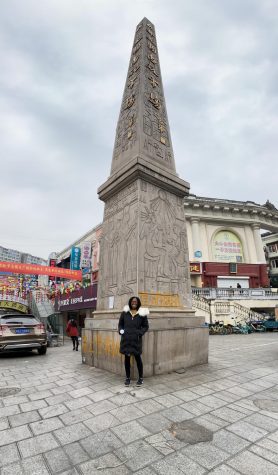Study abroad students pulled from China after new coronavirus outbreak
February 15, 2020
The new coronavirus has killed more than 1,000 people in China and sickened over 40,000 across the globe as of Monday, and App State students are feeling the ripples of what the World Health Organization called a “Public Health Emergency of International Concern.”
Monique Geter, a junior global studies major with a minor in Chinese, arrived in Chengdu, China, for her study abroad experience Jan. 10, but within a month, she was forced to return to the United States and transfer to another University Studies Abroad Consortium in Uruguay.
Geter was just one of “a handful of students” from App State who were asked to leave their study abroad program and return to Boone or transfer to another country in their third-party program due to the new coronavirus outbreak.
The new coronavirus is a respiratory illness that is a member of the coronavirus family, along with SARS and MERS, according to the Centers for Disease Control and Prevention.
Students from a variety of programs with many different durations — a year, a semester or an upcoming trip — were forced to leave China.
“I’ve always been interested in East Asia, and I find China particularly interesting because of its long history and rich culture,” Geter said. “Studying abroad in China would give me the opportunity to learn so much about Chinese culture while allowing me to increase my proficiency in Mandarin Chinese.”

Geter said she spent a lot of time studying the culture, applying through the Office of International Education and Development, applying for third-party programs and scholarships, and saving money before her trip.
During her time in China, Geter followed some U.S. news outlets and a handful of Chinese media outlets to monitor the new coronavirus.
Geter said the timing of the outbreak was inconvenient for the Chinese people because it came just before Chinese New Year, so many festivals were canceled and travel became difficult.
“When I went to Walmart, the security guard used (a) non-contact digital thermometer to take the temperature (of shoppers) before people entered to make sure no one had a fever,” Geter said.
Back in Boone, OIED was monitoring the coronavirus on an hourly basis. Jesse Lutabingwa, associate vice chancellor for OIED, said his office has never seen something of this magnitude and determined it was only going to get worse.
“We were concerned about the health and safety of the students,” Lutabingwa said. “We were concerned about the ability to be able to evacuate the students from China if things got worse, and, in fact, that has happened as airlines canceled their flights.”
Lutabingwa said App State is fortunate it began monitoring the situation well before the U.S. State Department changed its China travel advisory from a level three to a level four. Level three advises U.S. citizens to avoid travel to the affected country, while a level four advisory tells citizens not to travel to that country, often resulting in airlines canceling flights.
Lutabingwa said another reason the university moved swiftly to re-enroll its students was because the university system census was approaching, which plays into the number of students who can enroll for the fall.
“When we responded initially in calling our students back, we followed our own education abroad procedures to make sure that our students are safe and healthy,” Lutabingwa said.
While Geter was in China, she worked directly with OIED and her affiliate program to find a solution.
“At first, I thought I was going to be able to stay in China and just wait it out. We didn’t really know how fast it was spreading,” Geter said. “As the outbreak progressed, the safety of the students was prioritized, and my affiliate program decided it was best to cancel the program overall.”
When her program was canceled, Geter expected to come back to App State like many of the other students studying in China. However, USAC offered her a place in Montevideo, Uruguay, a country “completely different” from China — in temperature, language, culture, food and living situation.
Geter and other spring semester students were not the only ones affected by the virus and travel advisories. Programs for the summer were canceled as well.
The Walker College of Business Holland International Business Fellowship has partnered with Fudan University in Shanghai, China, for more than 20 years to focus on global learning. Each year, the Chinese students travel to Boone in March, and App State students visit Shanghai in May.
Holland Fellowship Director Jesse Pipes said in an official statement that after watching the coronavirus outbreak for weeks, the 2020 fellowship has determined to suspend travel to and from China.
“It is with a heavy heart that we make this decision, but at this juncture the possibilities of a reversal of travel restrictions is unlikely in a necessary timeframe,” Pipes said. “The planning and forecasting that goes into this program each year requires a great deal of certainty, and clarity is not something we have at this time.”
Pipes and Lutabingwa said major airlines have canceled all flights to and from China for the foreseeable future, making it challenging to schedule summer trips abroad even if the virus is contained by then.
“There is no way that we can responsibly purchase the tickets for things we don’t know what they are going to look like in the summer,” Lutabingwa said.
The students are disappointed that the trip will not be happening, but are more concerned for the friends they have made from Fudan.
“It’s very sad,” said Bailie Smith, a Holland Fellow and senior finance and banking major. “Someone in my cohort’s family is from the Wuhan district, and since it was Chinese New Year two weeks ago, they had to have virtual celebrations because of the travel bans.”
The fellowship will still work alongside Fudan through a “virtual experience,” and the App State students will travel to a different Asian country this summer, Pipes said.
As for trips in the fall, Lutabingwa said those are contingent upon the management of the virus, the status of the State Department’s travel advisory and the individual students’ comfort levels traveling to the region.











